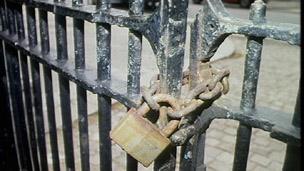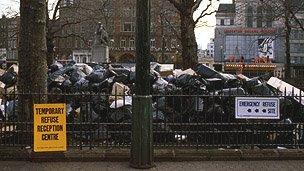Risks on all sides as strike looms
- Published

Many places across the country could be closed for business on Wednesday
School playgrounds will be silent and lecture halls still. Health workers will join the walkout and there could be chaos at Heathrow.
Wednesday will see the biggest public sector strike for a generation and the lesson from last time is that there are big risks for both sides.
When Jim Callaghan flew back into strike-torn Britain in January 1979, the typically cheerful prime minister reassured reporters that things were not that bad. "I promise if you look at it from the outside, I don't think other people in the world would share the view that there is mounting chaos", he said.
The Sun's subsequent headline read: "Crisis? What Crisis?"
With lorry drivers, dustmen, grave diggers and health workers refusing to work, the country was crippled - and so was Callaghan's government, which failed to get a grip and was consigned to history two months later.
The unions would be punished too, with Mrs Thatcher taking office determined to cut back their power.
Public opinion
Ministers, union leaders and Labour know the risks this strike holds for them and have been trying to win the fight for public opinion since the ballot results came in. The government argues the unions have jumped the gun by balloting members while talks are continuing.
The two sides have been locked in negotiations for a year and on 2 November ministers put forward a new and apparently final offer which they say is fair, reasonable and still better than pensions in the private sector. Ministers have also tried to discredit the ballots by repeatedly citing the low turnouts. Evidence, they say, that not even union members have much enthusiasm for a walkout.
The stick behind the government's back is the threat of new strike legislation. The government has also tried to mitigate the political risk by being candid about the likely disruption, rustling up a price tag for the strike of £500m and placing the blame squarely on the unions. But the great risk for the government is that voters will blame them for closed schools, cancelled flights and disrupted services.
That is why the unions have been arguing that it is government intransigence in negotiations that has forced them to this point. They're particularly angry at the Treasury's team who, the unions argue, announced deficit-plugging pension contribution increases from next April without proper consultation.
Union leaders are banking on public sympathy for their cause, at a time of frozen wages and job losses in the public sector. They are also determined to differentiate this strike from those of the past, by highlighting the high number of women workers who will take part. But a day of disruption is one thing. If, as the GMB's leader Paul Kenny predicts, there are further strikes in the new year that could quickly drain public support.
Labour is caught in a tactical tangle too. Trade union support secured the party's leadership for Ed Miliband and the unions are now by far the biggest donor to Labour. So they are irritated to say the least that Mr Miliband has refused to back the planned strike.
The Labour leader has so far swerved around the question of whether he will support it, instead urging both sides to carry on talking. By Wednesday he will have to make a choice - to condemn the strike or back it. Trying to straddle the two positions could invite ridicule at his indecision.
Desire for deal

The strikes of 1979 brought down the Labour government
Yet, despite the scale of the strike (more than two million people might take part) and the recent rhetorical punch-up between ministers and union leaders, this dispute does not feel like a 1970s-style showdown.
For a start, behind the bluster, the government and the unions are not miles apart on the main pillars of the pension plan. Negotiators on both sides have said agreement is close, and they know that a breakthrough is unlikely to be produced by picket lines.
Ministers have said bluntly that the current offer is the best there will be and it will not be on the table for long. They, and the leaders of the biggest unions, want a deal not a death match that carries huge risks for both sides.
- Published1 December 2011
- Published26 November 2011
- Published11 January 2012
- Published10 March 2011
- Published15 June 2011